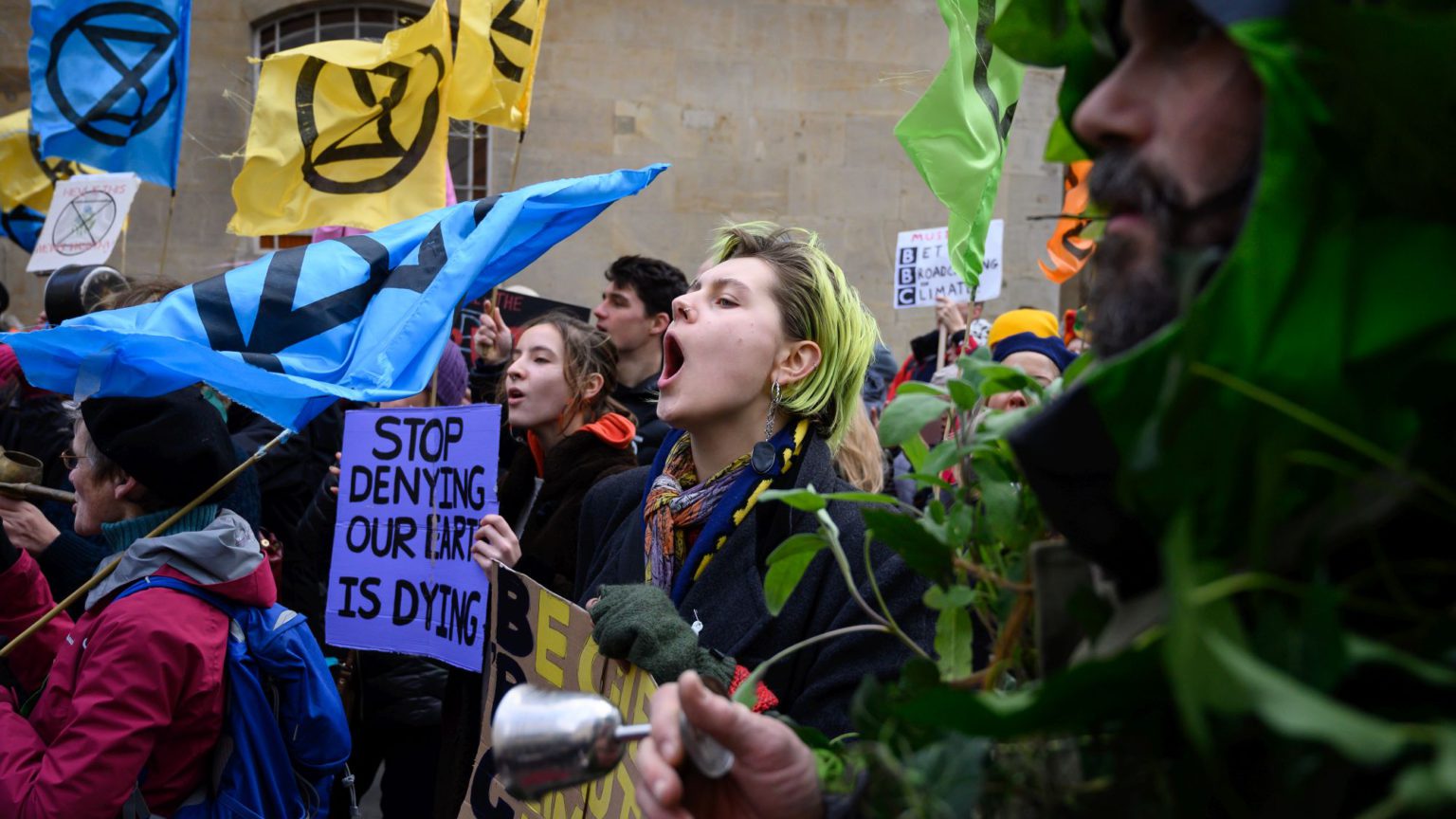Why is Extinction Rebellion protesting against gender-critical feminists?
Eco-warriors seem determined to alienate as many people from their cause as possible.

Want to read spiked ad-free? Become a spiked supporter.
Following the activities of groups trying to ‘save the planet’ is not an easy task these days. Since the summer of 2018, we have been introduced to Extinction Rebellion (XR), Animal Rebellion, Ocean Rebellion, Money Rebellion, Roads Rebellion, Youth Rebellion (there’s a bit of a theme here), Insulate Britain and the newest kid on the block, Just Stop Oil. XR also has a network of local groups. Some of these amount to little more than a Facebook page, but others, particularly those in certain university cities, are much stronger.
Step forward Extinction Rebellion Bristol, which this week found its USP – shutting down meetings of women’s rights activists. Tuesday evening’s Woman’s Place UK event at Bristol University, entitled ‘A woman’s place is with women: feminism, birth and motherhood’, was met by a counter-demonstration of some 50 activists. How did this come about? Earlier that day, XR Bristol’s Facebook page carried a post declaring: ‘Climate justice = trans rights! Trans Exclusionary Radical Feminists (TERFs) are not welcome in our city.’ It added: ‘Note that this is not an XR event.’ It had however been posted by the Facebook account of Extinction Rebellion Bristol, on its own Facebook page. In that post, protesters were advised to wear unidentifiable clothing and to cover their names and photographs on their students’ union cards, all in order to avoid ‘doxing’ by the ‘TERFs’.
Woman’s Place UK is a feminist organisation formed in 2017 to defend sex as a protected characteristic in UK law. In seeking to ensure women’s voices are heard in contemporary debates, it has received support from public figures such as Julie Bindel, Pragna Patel and Joanna Cherry. Woman’s Place UK causes apoplexy among some trans-rights activists, who have picketed its events since at least 2018. The Labour Campaign for Trans Rights has also referred to Woman’s Place UK as a ‘trans-exclusionist hate group’. Such claims provide the political backdrop to the campaigns against JK Rowling, and other women in public life who dare to hold what were once conventional views on sex and gender.
Why would XR want to step into this minefield? The group started out with three core demands: to ‘tell the truth’ about what its activists see as a ‘climate emergency’, to ‘act now’ to remedy the situation, and to create citizens’ assemblies to decide how their demands should be implemented. Political movements traditionally find success by appealing to the widest number of people in the broadest manner possible. A generation ago, the anti-Poll Tax campaign flourished precisely because it opposed a tax that was seen as unfair. It tended not to get bogged down in detailed discussions about how to finance local-authority spending. Anti-fascist groups like the Anti-Nazi League in the 1970s or Anti-Fascist Action in the 1980s and 1990s succeeded by physically disrupting the activities of fascist organisations, without necessarily developing a detailed programme to defeat such groups politically.
For some time now, there have been indications that certain XR groups have wider political ambitions and interests than those three initial demands suggest. XR Tower Hamlets, for example, has added a tortuously written fourth demand that is unlikely to be found whitewashed on to council-estate walls in Stepney anytime soon:
‘The government must implement a just transition to an ecologically balanced society, prioritising the needs and voices of the most vulnerable and redressing the past and present global inequalities caused by centuries of colonial, gender and class exploitation, while upholding all species’ rights to life.’
XR Leeds goes further, keeping the three existing demands, but inserting above them a ‘demand zero’:
‘We demand a just transition to an ecologically balanced, zero-carbon economy that prioritises the needs of the most vulnerable and redresses the inequalities in our society caused by centuries of colonial, gender and class exploitation.’
XR Bristol is therefore not alone in chasing after the other political causes of the day. Whether picketing a feminist meeting sits easily alongside opposing gender exploitation is a moot point. So far, XR itself, as its 2022 strategy document shows, is careful to avoid contentious issues such as trans rights. But at the local level, some activists clearly have a different approach.
Popular protest develops momentum when campaigns are supported by people from a range of ideological and political backgrounds, who unite in a way they have not done before around a particular issue. In adopting other unpopular causes, XR is doing the precise opposite.
This week was hardly the end of XR. But it potentially marks the beginning of the end.
Paul Stott is head of security and extremism at Policy Exchange. Follow him on Twitter: @MrPaulStott

How woke won – with Joanna Williams and Brendan O’Neill
Monday 16 May – 7pm to 8pm
Tickets cost £5, but supporters get in for free
Picture by: Getty Images
Who funds spiked? You do
We are funded by you. And in this era of cancel culture and advertiser boycotts, we rely on your donations more than ever. Seventy per cent of our revenue comes from our readers’ donations – the vast majority giving just £5 per month. If you make a regular donation – of £5 a month or £50 a year – you can become a and enjoy:
–Ad-free reading
–Exclusive events
–Access to our comments section
It’s the best way to keep spiked going – and growing. Thank you!







Comments
Want to join the conversation?
Only spiked supporters and patrons, who donate regularly to us, can comment on our articles.